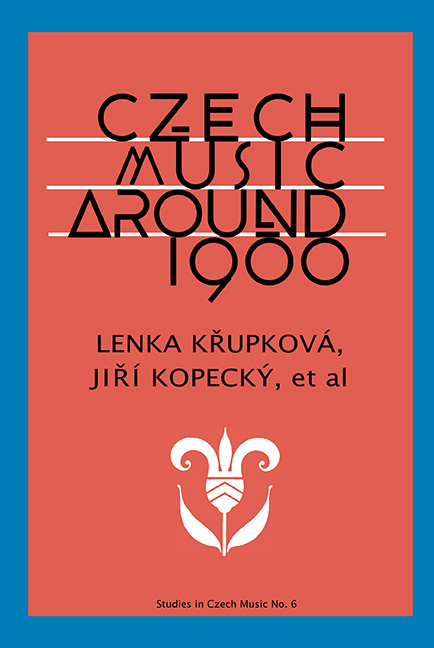Book contents
- Frontmatter
- Table of Contents
- Introductory Remarks on the Conception of This Book
- Flowers in the Graveyard, Tombstones in the Garden
- The “Other World” of Music at the Turn of the Century
- In the Footsteps of Tradition: The Spirit of Romanticism
- Czech Music at the Heart of European Music round 1900
- Novák as an Axial Figure in Czech Music
- Novák's Reception Abroad
- Josef Suk, Dvořák's Favorite Pupil
- Fibich's Path to Success in Prague's National Theater
- Tchaikovsky, Charpentier and the Formation of Janáček's Mature Operatic Style
- Josef Bohuslav Foerster's Lyrical Opera Eva and the Tradition of the French Drama lyrique
- Otakar Ostrčil and Mahler's Influence in Prague
- Folk Culture as an Outward Source of Artistic Inspiration: Vítězslav Novák the Tourist
- The Clash with Compositional Issues of European Music
- Index
- List of Illustrations
- About the Authors
- List of Sources Cited
Tchaikovsky, Charpentier and the Formation of Janáček's Mature Operatic Style
from Czech Music at the Heart of European Music round 1900
- Frontmatter
- Table of Contents
- Introductory Remarks on the Conception of This Book
- Flowers in the Graveyard, Tombstones in the Garden
- The “Other World” of Music at the Turn of the Century
- In the Footsteps of Tradition: The Spirit of Romanticism
- Czech Music at the Heart of European Music round 1900
- Novák as an Axial Figure in Czech Music
- Novák's Reception Abroad
- Josef Suk, Dvořák's Favorite Pupil
- Fibich's Path to Success in Prague's National Theater
- Tchaikovsky, Charpentier and the Formation of Janáček's Mature Operatic Style
- Josef Bohuslav Foerster's Lyrical Opera Eva and the Tradition of the French Drama lyrique
- Otakar Ostrčil and Mahler's Influence in Prague
- Folk Culture as an Outward Source of Artistic Inspiration: Vítězslav Novák the Tourist
- The Clash with Compositional Issues of European Music
- Index
- List of Illustrations
- About the Authors
- List of Sources Cited
Summary
JANÁČEK AND RUSSOPHILISM
Janáček's first opera Šárka, JAWO I/1 (1887-88), it has been argued, owes much to Wagner. At this stage Janáček's knowledge of Wagner was limited to an unspecified piece that he heard at a Vienna Philharmonic Concert on 4 April 18804 and the prelude to Tristan und Isolde (on which he had published an analytical article in 1885, JAWO XV/30). In fact, most of the “Wagnerian” traits in the opera go back to the libretto by Julius Zeyer, a poet with a wide European culture and extensive knowledge of what was going on elsewhere in Europe. Since Šárka was written in the mold of a traditional Czech mythological/historical opera, a more convincing model for it, proposed by Vladimír Helfert, is Smetana's heroic opera Libuše: in terms of story Šárka is a sequel to Libuše, taking up the story after the death of Libuše. While the path that Janáček was following at the time climaxed with this opera it also came to an abrupt end with it. Not consulted until Janáček had composed the opera, Julius Zeyer refused to give permission for him to set his text and thus doomed any attempt at the time to stage the opera. It was first performed only in 1925, thirty-eight years later, by which time Janáček was famous and Zeyer was dead. This fiasco was, however, a turning point that sent Janáček off in the direction of Moravian folk music, which he assiduously collected, edited, and arranged, with a discernible impact on his own style: most of his compositions between 1889 and 1894 were in some way related to Moravian folk music, including his second opera Počátek románu (The Beginning of a Romance, JAWO I/3, 1891-92).
This abrupt turn of style was not entirely new. Pavel Křížkovský (1820- 85), in charge of music at the Augustinian Monastery in Brno, where Janáček was a chorister from 1865, did not give his young pupil composition lessons, but his “ohlasový” choruses—choruses using folk texts and attempting to “echo” folksong in their simplicity of style—became models for Janáček when, some years later, he began composing his own choruses for the malevoice amateur choir “Svatopluk” that he conducted from 1873. Arguably, Moravian folksong had been familiar to Janáček from his childhood and had simply been overlaid with current European music.
- Type
- Chapter
- Information
- Czech Music around 1900 , pp. 167 - 184Publisher: Boydell & BrewerPrint publication year: 2017

